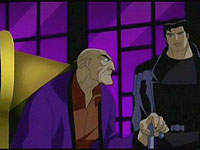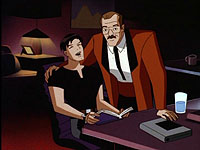 |
Wertham's Ghost
Posted:
February
5, 2002; Revised: April 19, 2006
On July 23, 2005, American audiences first viewed "Epilogue," the season finale of another Timmverse vehicle, Justice League Unlimited. After an unprecedented thirteen years of creativity, the animated continuity illustrated (and often written) by Bruce Timm has come to be acknowledged as one of the best interpretations of the Batman character in its 65-year history. In "Epilogue" Timm joined with writer Dwayne McDuffie to tie up loose ends even as they looked toward unexplored horizons. This episode has been described as a love letter to the fans, a "game of hide and seek with questions of fate and character formation," a Moebius strip of plot/theme, a study in power/control, or just plain "phenomenal." To explore every ramification of this late entry would fall outside the scope of this essay, yet we would be remiss not to mention its unmistakable (think meteor crater) impact on Batman's world. It redefines Batman Beyond as the canonical future, and it rewrites the most intimate chapters in the lives of Terry McGinnis and Old Man Wayne.
 This writer is not so presumptuous as to believe that the Timmverse writers would craft an episode specifically to address the concerns raised in a previous version of this essay. Nevertheless "Epilogue" does address those concerns, in ways both brazen and brilliant. For, you see, the episode dares to take both the indirect approach and the direct approach, alternately then in support of each other, until they merge into one "reality."
This writer is not so presumptuous as to believe that the Timmverse writers would craft an episode specifically to address the concerns raised in a previous version of this essay. Nevertheless "Epilogue" does address those concerns, in ways both brazen and brilliant. For, you see, the episode dares to take both the indirect approach and the direct approach, alternately then in support of each other, until they merge into one "reality."
Initially it is the direct approach which clamors for our attention. The story is told gracefully, if the raw details are coarse: the steely woman warrior Amanda Waller becomes fascinated with Bruce Wayne's Batman, enough to do something about it. Like Tolkien's Aule, she is just trying to help God out a little. Her definition of "helping" prompts her to steal Bruce/Batman's DNA from a blood sample and to introduce it into Warren and Mary McGinnis' marital bed. The result is that Warren McGinnis sacrifices his time, finances and ultimately his life to nurture and protect another man's children. That he chooses to sacrifice himself to save lives is significant; Waller would have deprived him of that choice as well, in the single-minded pursuit of her own goals. Instead, Warren lives long enough to become a whistleblower at Wayne's company, and dies as one. Warren is Terry's inspiration, but he is not of Terry's blood. Terry understandably feels coerced when he learns this, and, knowing no other foe with the capacity or motive to violate his family, he assumes that Bruce Wayne himself is the culprit. To Terry's shock, Waller comfortably takes blame/credit for the whole thing.
It is at this point that many of Terry's fans reject the story in anguish or outrage. Terry himself stops there, in part because Wertham would have stopped there. It is safe to say that Wertham would have evaluated Waller's exploitation of Mary and the three men in question in terms both impolite and unprecedented. (Indeed, what fan can ever again look at the episode "Rebirth" in the same way? The innocent first-time meeting between Mary and a man old enough to be her grandfather who, unbeknownst to either of them, just happens to be the father of her sons, surely provokes a few uneasy stomachs.) However, it could be argued that "Epilogue" intended to disturb the audience. Terry needs to yell; Waller has worked out her salvation or judgment years ago (and off-screen); therefore Terry cannot yell at her because she has grown beyond the ability to receive it. Thus Terry's frustration is recreated for the viewer's sampling as well.
The catch is that, because the direct approach is direct, it does not stop there. Amanda Waller's need to control her environment causes her to see children like Ace and Terry and even her hero, Bruce/Batman, as mere experiments that any competent scientist should be able to document and replicate, given the technology and ingredients; she must be disabused of this notion. Terry is very ready to blame Bruce; he must be disabused of this notion as well. Terry believes he cannot marry; he must be challenged by the grown Dana Tan who, refreshingly, has been restored as the strong-minded but sympathetic partner she used to be in her first televised season.
Ultimately the point of "Epilogue" is not to document Waller's act of exploitation (now thirty-five years past in "story" time) but to inquire whether the characters allow themselves to be defined by it. Terry's initial reaction is to argue Yes; believing himself to be artificially engineered to live another man's life, he feels too smothered to pursue his own dreams. That Terry already is pursuing said dreams until this shocking revelation comes to light is a point he declines to consider, preferring instead to indulge in some rather high-flown revenge fantasies. (Even in his fantasies, Terry's relationships with Warren and Bruce remain unchanged: Terry is sarcastic, defiant, and rarely does anything the easy way if there is a harder way to do it; say, talking versus yelling.) It is Waller, the one who created this mess, who must make things right. She does not apologize (events are surely way, way past "sorry"), but she reminds Terry of a lesson she also had to learn: that character arises more from choice than history or biology. People are not paint-by-numbers kits; they have dignity, spirit.
The apparent downside of this direct approach is that it appears to devalue Dick Grayson and Tim Drake as Bruce Wayne's sons, and to devalue Warren McGinnis as Terry's father. This is where the indirect approach comes into play. Does Terry's presence disqualify Dick and Tim from being Bruce Wayne's sons? Has the biological child replaced the adoptive children in terms of inheritance? Have the series' creators become those obnoxious persons who inquire of adoptive parents whether they also have "real" children? Of course not. Dick and Tim were not Bruce Wayne's roommates—they were children he raised, albeit children he often failed. (They might want never to see him again, but that's entirely different.) Dick and Tim are not missing from Old Man Wayne's life because they are not family, but perhaps because they are. For who else can enrage or hurt us so deeply but family? Bruce's mistakes wound his boys so deeply precisely because they are too personal, not the blows of a stranger. In like manner, Warren is not Terry's babysitter but his father. Bruce Wayne did not raise Terry; he did not sit up with a sick child, or help him with homework, and Terry did not become Batman to honor his biological father but his faithful father.
When "Epilogue" aired, one fan asked, "Is it a crime to change the random occurrences of ‘Rebirth's’ first meeting of Terry and Bruce into something ordained by the slow, grinding wheel of Fate? Not really; coincidence is no more justifiable or preferable than the other, outside of the realm of opinion." Ultimately the viewers responded to this development with that mixture of delight and nausea that one experiences after sampling a rollercoaster that proved more ambitious than one's sensibilities. Nevertheless, in very few cases did the initial queasiness at the proposal deter them from riding again.
 "Epilogue" turns inside out the original question : "Is Old Man Wayne any less a father figure to Terry just because they are unrelated?" Now the situation is reversed. The audience must inquire, "Is Warren any less a father figure to Terry just because they are unrelated?" The viewer who would answer "He is still a father figure" to the one question is compelled to answer the question the same way when matters prove to be the other way around. For one of the perennial themes of Batman's myth and world is that family is not merely blood but a choice. Through Bruce/Batman's identification with Dick Grayson, with Tim Drake, with Ace, and with Terry McGinnis, he extends the definition of family to include the human family.
"Epilogue" turns inside out the original question : "Is Old Man Wayne any less a father figure to Terry just because they are unrelated?" Now the situation is reversed. The audience must inquire, "Is Warren any less a father figure to Terry just because they are unrelated?" The viewer who would answer "He is still a father figure" to the one question is compelled to answer the question the same way when matters prove to be the other way around. For one of the perennial themes of Batman's myth and world is that family is not merely blood but a choice. Through Bruce/Batman's identification with Dick Grayson, with Tim Drake, with Ace, and with Terry McGinnis, he extends the definition of family to include the human family.
The typical superhero is always saving the world. He or she never asks whether this world is worth saving. That is Batman's question. Each time he risks it all to save one life, he says Yes. To him one life is worth the world. It is that quality to which Amanda Waller responds, however crudely and uncomprehendingly. There is great irony here, as this is the same quality that Batman failed to communicate to Fredric Wertham, who was specifically looking for it and, after his fashion, dedicated his life to pursuing much the same principle.